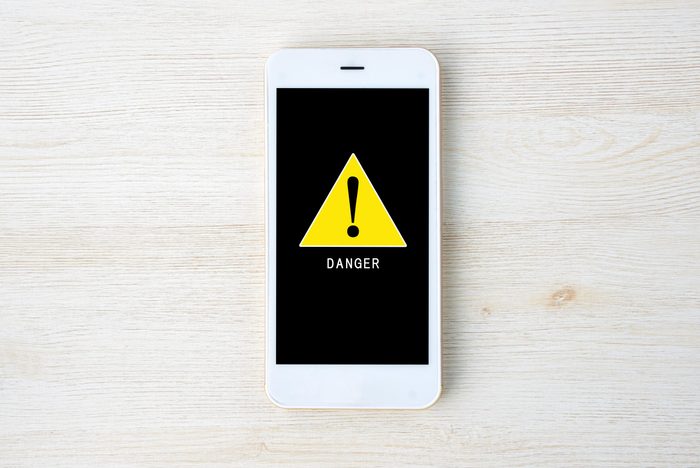iPhones are one of the most secure devices worldwide, and the credit goes to iOS. Undoubtedly, the immunity of iPhones against any kind of cyber threat is quite strong. However, iPhone users have reported that their smartphones have started acting weird, and they couldn’t discard the presence of viruses. But, can iPhones get viruses from the internet or any other browsing activities?
Viruses on iPhones are rare, but they can get infected through the process called ‘jailbreaking’. Jailbreaking involves rooting the iPhone and compromising security restrictions that prevent suspicious operation of the software. To prohibit jailbreaking, Apple releases compatible security patches for iPhones and other iOS devices.
What happens if your iPhone falls victim to jailbreaking? It can compromise the system lock mechanism, download unapproved applications, deletion of pre-installed applications, and much more. The addition of malicious applications can be more dangerous for your iPhone and your security. Let’s find answers to queries regarding iPhones and virus attacks on these devices.
Are iPhones Immune against Viruses?
Viruses are programmed snippets of code that have the capability of replicating themselves. They are sufficiently malicious and can cause damage to your network devices by deleting important applications and information. They can spread through the help of compatible software in that particular device and contaminate the entire system.
iOS makes this difficult for viruses. Apple designs iOS to operate every application in its virtual space. The applications are restricted to having mutual communication with each other. This is why the virus doesn’t get higher chances to move from one application to another on your iPhone.
Additionally, we can’t deny the contribution of the App Store that allows only legitimate applications to be installed on the iPhone. The verification process of the App Store is very strict and hence, malicious applications can barely enter your device.
How to detect Whether your iPhone Has a Virus?
iPhone users have complained that they have found their iPhones behaving quite weird. The battery seems to be draining power too quickly, a few apps that are not installed manually, and lack of space might be the alarming signs of your iPhone dealing with viruses. These are instances that can be triggered by only viruses or similar malicious software.
Additionally, there are a few questions left to be answered. If you have jailbroken your iPhone, then the device might be on the edge of vulnerability. Moreover, apps might start crashing now and then, and you can’t find the exact cause of higher data usage these days.
If you are experiencing a sudden phone bill spike, you need to be alert. Unnecessary overheating might denote that malicious applications are running in the background.
On a contrary note, you might receive a few ‘warning’ messages on your iPhone stating that your iPhone has viruses. These circumstances mostly occur when you are browsing different web addresses on your browser, Safari.
Don’t let these messages fool you out. These are generally scams and might lead you to malicious sites once you tap on them. So, refrain from pressing or tapping any such warning messages.
Ways to Make your iPhone Virus-Free
Detecting a virus on your Phone is quite tricky. But, if you are experiencing a few of the above-mentioned symptoms, then you can be sure that your iPhone has got viruses. Though there are fewer chances that your iPhone can get viruses, the chances are never zero.
However, you can remove viruses from your iPhone in the following methods. They are easy to implement and prevent virus attacks in the near future.
Remove Sceptical Applications
Go through your iPhone’s App Library and check whether all the apps are legitimate and installed by you or come pre-installed. If you find anything suspicious, then immediately remove them.
Just hold the app’s icon and go for the Remove option. Confirm the removal operation from your device.
Get Rid of Website History and Data
Go to Settings and select Safari. Choose the ‘Clear history and website data’ to be on the safe side. This will restrict the spread of malicious programs across your iOS device.
Restart your iPhone
If you are facing overheating, extreme draining of battery, etc., then you should try this hack. Press and hold the Power button and the power slider will appear on your device. Turn off the iPhone by dragging that slider. Wait for a while, and again, press and hold the Power button to turn on the device.
Use a Previous Backup and Restore your iPhone
You can restore your iPhone from a previously saved backup. You can either use iCloud or access the iTunes application to get the latest backup of your iPhone. It makes sure that you will get your iPhone back without anything malicious.
Get Factory Settings
In case nothing seems to be working, you can try this last sort. Restore factory settings on your iPhone by exploring Settings. Then, tap General followed by the Reset option. Opt for the ‘Erase all content and settings’ option. Don’t forget to restore backed-up data on your iPhone once the iPhone retains factory settings.
How to Keep your iPhone Safe from Potential Threats?
After you have removed viruses from your iPhone, you must adopt a few safety habits to keep such chances at bay. Don’t use public Wi-Fi connections and never click unverified messages or links.
Make sure that you install applications through the App Store only. Additionally, read out reviews on the App Store regarding the application that you want to install on your iPhone.
You will be on the safe side if you check out the developer description, as well. While providing permission, check every permission that the app is asking for. Don’t permit it, if you think that your security can be compromised. Keep updating every application on your iPhone. Finally, keep your iOS updated from time to time, or set it on an automatic update mode.

